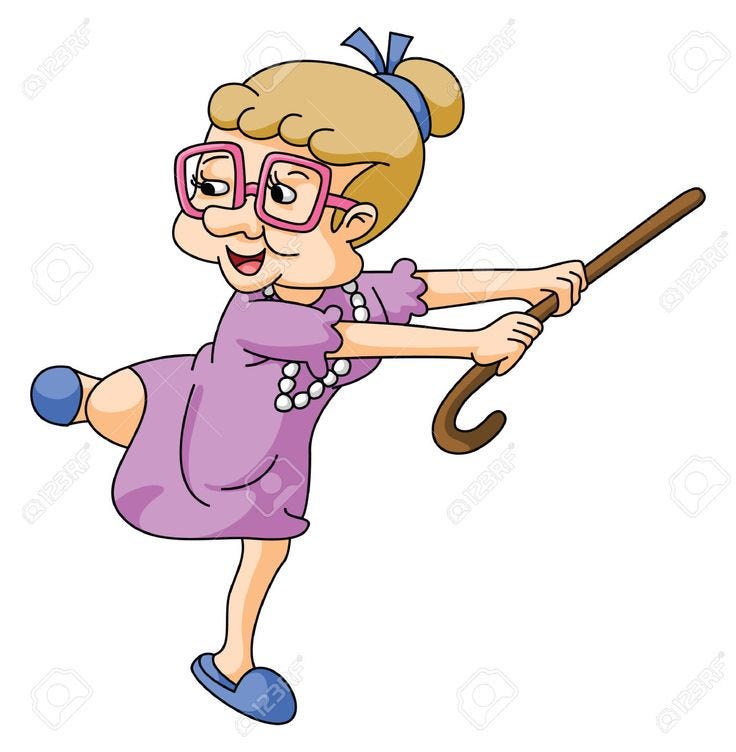Aging Well
Are You Up For It?
We planned to age well, together, but that was not to be. Today, it’s just me!
I sit here at the dining room table – an 82-year-old woman, recently widowed, worn down from taking care of her husband who battled dementia for five years and tending to their affairs after he died – debating whether or not I have what it takes to age well on my own.
Aging well isn't just about trying to look younger—it’s about living your best life and having the physical and mental health to enjoy it. Like a bottle of fine wine, you get better with age given the right care. However, it takes motivation and energy to provide yourself with that care. Do I still have enough?
On one hand, I could just be a couch potato: curl up with a good book, watch television, eat junk food, and stay home with my cats, Bella and Bailey.
On the other hand, I really do not want to have multiple medical issues requiring multiple doctor visits, trips to the hospital, and multiple drugs. I do want to be independent and contribute to life, do things with my family, take little trips, write newsletters, and learn to paint. It seems as if those “wants” require a willingness to take care of myself and age well.
So, what is the debate? I have reasons to age well, but things get in the way. Things such as a lack of purpose, an unwillingness to accept, and unproductive choices.
A LOSS OF PURPOSE
Psychologists say that having a purpose guides life decisions, influences behavior, shapes goals, and offers a sense of direction. It is a reason to get up in the morning.
For over 60 years my purpose was to take care of my husband. When he died, so did my purpose. Maybe, those “wants” can be my new purpose - at least for now.
AN UNWILLINGNESS TO ACCEPT
Acceptance is a person's agreement to the reality of a situation, recognizing an often negative or uncomfortable condition without attempting to change or protest it.
Accepting my husband’s decline and death has been a challenge. I didn’t want to live life without him or be on my own. But, then, whether it be the physical changes that occur as my body ages, the knowledge that all my dreams and bucket list wishes probably won’t come true, or the truth that running a 5K race is out of the picture, accepting is not easy.
What if my definition of acceptance changed, though? What if I thought of acceptance as an acknowledgment that some things in life aren’t fair and that it is the first step in moving beyond them? What if I saw acceptance as an act of courage in facing an unwanted reality and a shifting of focus from what can’t be to what can? That would be a more positive way of thinking and one that allows me more control.
Dr. Shirlene Rizvi, Director of the Dialectical Behavior Therapy Clinic (DBT-RU) and Clinical Professor of Psychiatry at Rutgers University suggests that the answer is radical acceptance. Take a few minutes to listen to her YouTube video.
You can accept or reject reality. However, rejecting something does not change anything, it just causes pain, suffering, and stress. No one is suggesting that you like, want, or support whatever is occurring. Yet, by struggling against it, you create undue suffering for yourself.
UNPRODUCTIVE CHOICES
I want to pursue aging well - true. I identified a purpose and a new way of accepting what is - true. Does it boil down to my choices, then?
Currently, my choices vacillate between lounging around and doing things that allow me to live my best life.
Doubts continuously raise their ugly heads and cause problems! Can I do this? Do I want to put in the effort to eat nutritious food, exercise daily, and have a social life? Can I get myself to do the things that need to be done even though I don’t want to? Am I too old to travel or hike? Will I hurt myself?
Maybe, doubts occur - and - my thinking supports my “wants” or sabotages them. If I find my own motivation, develop inspiration from within, and don’t talk myself out of it, there is a better chance of making choices that support my underlying purpose and give me the opportunity to live my best life with the physical and mental health to do so.
Everyone makes similar choices as they age. They can passively accept the inevitable changes that occur or make choices to work around them - to age well and live their life to the fullest in spite of them. I am up for it, are you?
As Catherine Pulsifer, the author, says
And in life it is all about choices we make, and how the direction of our lives comes down to the choices we choose.


